|
|
|
Sort Order |
|
|
|
Items / Page
|
|
|
|
|
|
|
| Srl | Item |
| 1 |
ID:
174822


|
|
|
|
|
| Summary/Abstract |
Existing studies of the impact of economic development on political trust in China have two major gaps: they fail to explain how economic development contributes to the hierarchical trust pattern, and they do not pay enough attention to the underlying mechanisms. In light of cultural theory and political control theory, we propose adapting performance theory into a theory of “asymmetrical attribution of performance” to better illuminate the case of China. This adapted theory leads to dual pathway theses: expectation fulfillment and local blaming. Using a multilevel mediation model, we show that expectation fulfillment mainly upholds trust in the central government, whereas local blaming undermines trust in local governments. We also uncover a rural–urban distinction in the dual pathway, revealing that both theses are more salient among rural Chinese.
|
|
|
|
|
|
|
|
|
|
|
|
|
|
|
|
| 2 |
ID:
174821


|
|
|
|
|
| Summary/Abstract |
This article explores how the political connections cultivated by Pakistan’s business groups contributed to their rise as key actors in the corporate sector. Such connections have long been used by business groups in developing countries to secure access to economic rents from politicians in power. We examine the basis of selection of business groups for state patronage under military and civilian-led regimes, as well as the extent to which such ties have contributed to their rise as Pakistan’s leading enterprises. A historical analysis is provided of these groups, with a focus on a financial review of their publicly listed companies. We find that emerging business groups actively resort to rent-seeking activities by colluding with ruling elites, while also using multifaceted networking to protect and enhance their presence in the corporate sector.
|
|
|
|
|
|
|
|
|
|
|
|
|
|
|
|
| 3 |
ID:
174818
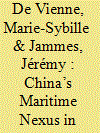

|
|
|
|
|
| Summary/Abstract |
At the 17th ASEAN Regional Forum in 2010, Chinese Minister of Foreign Affairs Yang Jiechi reminded everyone that “China is a big country and all the other countries are small countries; this is a fact.” Though Brunei is the smallest of all the ASEAN states in both population and GDP, the level of Chinese investment in the sultanate (cumulated direct investment and construction contracts divided by 2018 GDP) is much higher than in most other ASEAN states. This paper analyzes the Belt and Road stakes for both Brunei and China and Brunei’s response to the Chinese proposals, showing that in spite of its smallness, the sultanate still seems able to preserve its own interests to a certain extent, thanks to its balanced foreign policy and its financial resources.
|
|
|
|
|
|
|
|
|
|
|
|
|
|
|
|
| 4 |
ID:
174817
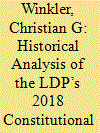

|
|
|
|
|
| Summary/Abstract |
In 2018 Japan’s Liberal Democratic Party announced four new proposals to amend the seven-decades-old and thus-far unamended constitution of Japan. These include adding a third paragraph to Article 9, as well as state-of-emergency provisions, support for students in need, and changes to the electoral system. By analyzing each proposal’s place in the debate on amendments dating back to the 1950s, I show that these very different proposals share one important feature that sets them apart from recent drafts aiming for wholesale reform of the constitution: they are relatively minimalist in nature. This new modesty is due to the necessity to win over other parties and voters, but it is also an attempt to cement rather than to change the LDP-made status quo.
|
|
|
|
|
|
|
|
|
|
|
|
|
|
|
|
| 5 |
ID:
174819
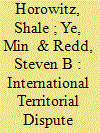

|
|
|
|
|
| Summary/Abstract |
Within international relations theory, there is significant disagreement on the nature and significance of leaders’ dispute outcome preferences. While many variants of realism assume that such preferences are relatively fixed and homogeneous, both the liberal and the constructivist schools view them as significant variables. This debate remains unresolved because, for the standard large-sample conflict data sets, there are no direct measures of leadership preferences over outcomes in given types of international disputes. Using a conflict bargaining experiment, we ask whether, after controlling for the effects of relative power and initial conditions, leadership preferences have a statistically significant impact. We use two different country samples—from China and the United States—to examine whether the impact of leadership preferences varies internationally. We find that realist-style preferences are a special rather than a general case, and that such differences have significant implications for understanding continuities and changes in Chinese and US foreign policies.
|
|
|
|
|
|
|
|
|
|
|
|
|
|
|
|
| 6 |
ID:
174814
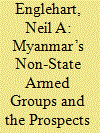

|
|
|
|
|
| Summary/Abstract |
Myanmar has suffered the world’s longest civil war, with continuous combat since shortly before the country’s independence from the UK in 1948. A new National Ceasefire Agreement has raised hopes that peace may finally be in sight. However, optimism should be tempered by a recognition the peace process has not built much trust, reduced the number of non-state armed groups in the country, their total size, or significantly improved their human rights behavior. This is demonstrated through an analysis of original data on the major non-state armed groups active in Myanmar between 1985 and 2017. Peace will require hard political work leading to disarmament, restraining the military, and reassuring the country’s ethnic minority groups that their rights and interests will be respected even without the threat of insurgent violence.
|
|
|
|
|
|
|
|
|
|
|
|
|
|
|
|
| 7 |
ID:
174815
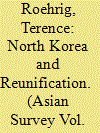

|
|
|
|
|
| Summary/Abstract |
Efforts to denuclearize North Korea continue, but it is highly doubtful whether this goal will be reached. An often-expressed fear of a nuclear-armed North Korea is that it might use this capability to coerce reunification with the South on its terms. Though its leaders often speak of the desire for reunification, North Korea will not and could not pursue a successful nuclear coercion strategy because it carries an inordinate amount of risk, even for Pyongyang, which raises serious doubts about the credibility of its nuclear threats, the possibility of success, and the likelihood of pursuing such a strategy in the first place. And even if North Korea were to succeed, its efforts to integrate the South Korean economy would be a disaster, leading to the end of the North Korean regime.
|
|
|
|
|
|
|
|
|
|
|
|
|
|
|
|
| 8 |
ID:
174812
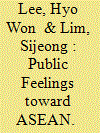

|
|
|
|
|
| Summary/Abstract |
What determines how ASEAN is perceived by the citizens of its member states? Most studies on ASEAN take a state-centric and elite-oriented viewpoint. We improve on this by bringing the people of ASEAN into the center of the analysis. Considering lessons from the European Union’s internal legitimacy crisis, we develop hypotheses on how skill-based economic interests, sociocultural beliefs, and assessments of national context shape people’s attitude to ASEAN. Our hypotheses are tested using the latest data from the Asian Barometer Survey, covering eight of the 10 ASEAN countries. We find that citizen confidence in domestic governance and a positive assessment of major extra-regional powers are associated with a closer identification with ASEAN. Our analysis also identifies age and gender cleavages. ASEAN affinity is higher among older rather than younger and male rather than female respondents. Our findings have important policy implications for the proponents of ASEAN.
|
|
|
|
|
|
|
|
|
|
|
|
|
|
|
|
|
|
|
|
|